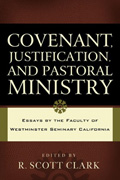
R. Scott Clark, Ed.
Reviewed by: Donald M. Poundstone
Covenant, Justification, and Pastoral Ministry: Essays by the Faculty of Westminster Seminary California, edited by R. Scott Clark. Published by P&R Publishing, 2007. Paperback, 465 pages, list price $24.99. Reviewed by OP minister Donald M. Poundstone.
Talking about justification used to be easy. Orthodox Protestants simply relied on the thinking and formulations of the magisterial Reformers in the sixteenth century and their successors. The recent appearance of scholars pushing a "New Perspective on Paul" and the "Federal Vision," to say nothing of Norman Shepherd and his followers, has changed the landscape. Reformed conservatives now scramble to defend - and sometimes further develop - the historic confessional doctrine.
This hefty collection of essays by ten seminary professors - three of them Orthodox Presbyterian ministers - is only one of many efforts aimed at fending off attacks on what Martin Luther called the article of faith that decides whether the church stands or falls. It is a worthy and valuable contribution to the current debate.
Scott Clark and David VanDrunen start off with illuminating historical orientation. Then follow exegetical articles by lain Duguid, Bryan Estelle, and S. M. Baugh. Theological meat (i.e., discussions of the covenant of redemption, covenantal nomism, imputation of Christ's active obedience, the role of faith in justification, and the relation between justification and sanctification) is then served up by VanDrunen, Clark, Michael Horton, W. Robert Godfrey, and Hywel Jones. In the closing section, practical concerns are helpfully addressed by Jones, Clark, Julius Kim, and Dennis Johnson.
The authors agree on the importance of the covenant of works, the merit of Christ's righteousness, and the imputation of his active obedience to a sound doctrine of justification. They likewise stress the vital distinction between (yet the inseparability of) justification and sanctification, and give clear priority to the believer's once-for-all justification. In their view, both the New Perspective on Paul and the Federal Vision simply repeat medieval theological errors and thus undermine the true Reformed and biblical doctrine of justification by grace through faith alone. The essays ably articulate and defend the teaching of Reformed orthodoxy.
In spite of its many strengths, the book likely will not stand as the definitive word on the subject. Even sympathetic scholars will challenge some of its historical analysis and theological emphases. For example, a renewed (and maybe skewed) focus on union with Christ by critics of the traditional Protestant doctrine of justification seems to have made some of the orthodox squeamish over any talk of union with Christ in the context of justification. The Westminster divines showed no such fears. Their Larger Catechism (Q. 65-69) states that effectual calling creates our union with Christ, and that in communion with him we partake of justification, adoption, sanctification, and other spiritual blessings. The Catechism then proceeds (Q. 70) to state its doctrine of justification by the imputed righteousness of God's Son. If seventeenth-century divines embraced both union with Christ and justification by faith, so should we.
This book is a worthwhile and reliable contribution to the ongoing conversation about a foundational article of the faith. Pastors and other church officers will find it informative and stimulating, as will all Christians interested in better understanding and cherishing the glorious truth of justification.
January 11, 2026
Texts that Transform: Church and Ministry
January 04, 2026
December 28, 2025
December 21, 2025
December 14, 2025
December 07, 2025
November 30, 2025
© 2026 The Orthodox Presbyterian Church